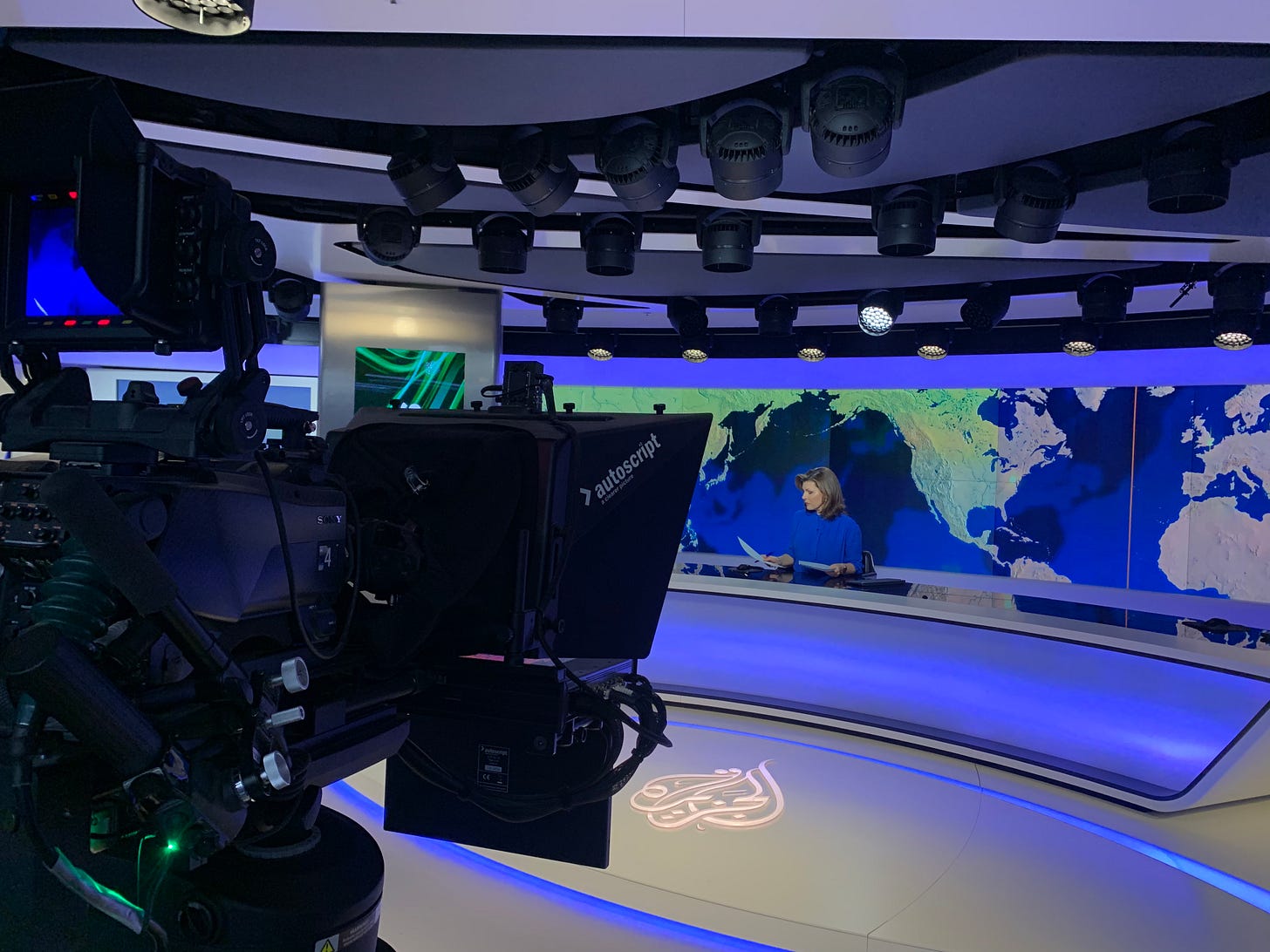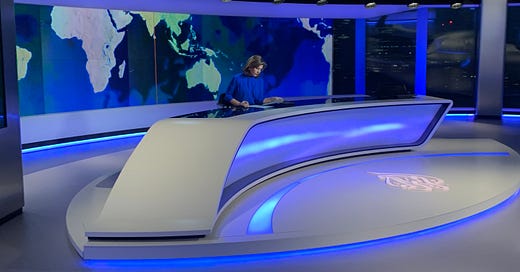Substack vs Twitter, and goodbye Al Jazeera London
A tech media spat, Twitter's possible replacement, and my deep sadness at the closure of Al Jazeera's London Broadcast Centre
A mishmash of media stories for this week’s newsletter, but there’s method to the madness, I promise. Though one story looks ahead and the other at the past, they have a common thread: Diversity in media and the need for a plurality of voices.
OK, let’s start with Substack. If you’re reading this, you obviously know what it is and you can rightly assume that I love this platform.
I’m used to writing for different audiences on different mediums, but I’m my most sincere, unguarded me in these newsletters. I genuinely see it as a conversation between us and I appreciate that you letting me into your inbox is very different to a mere follow on social media. I don’t mind disagreements and being challenged, and always engage in the comments section. What I do mind is the blind vitriol you so often find on Twitter, and the propensity of many users to twist any statement that contains the slightest nuance into some sort of personal attack.
But Twitter has, rightly or wrongly, become an essential tool for journalists. Its reach is unrivalled. Other social media platforms have significantly more users, but when it comes to impact on news, policy and debate, none of them even come close to Twitter.
I wish it wasn’t so. I love Instagram and LinkedIn, but Twitter is where it’s at.
And then along comes Elon Musk. He bought the platform for $44billion in October, promptly sacked half the staff, told the rest to be ‘hardcore’ or leave, reinstated a lot of accounts that had been banned under the previous ownership, automatically replies to press enquiries with a poo emoij and has changed the authentication process - the Blue Tick to you and I - and made it accessible to anyone, for a fee.
If you’re interested in his reasoning, Musk gave a much talked-about interview to the BBC this week, which you can read about here. (As an aside, I do feel for the BBC reporter involved. Big interviews are always nerve-racking and as an interviewer you need to go in with hard facts and figures to back any assertion you make or the interviewee, who will know their subject inside out, will eat you alive. I think there was a little bit of eating alive done by Elon Musk here, though the reporter apparently didn’t have any time to prepare for the interview.)
The end result is that Twitter is not the place it was before the Musk takeover, and many high profile accounts are threatening to leave. But the question is, where would they go?
And this is where our new kid on the block Substack tried to save the day by launching its own microblogging service ‘SUBSTACK NOTES’.
(You can find it in the Substack App and I’ve put together a little guide to Notes at the end of this newsletter.)
It is fair to say that Musk did not take it well. Over the Easter weekend (so much for peace and redemption) any tweet linking to a Substack newsletter could not be liked or retweeted and it was pretty much buried by the algorithm. If you did manage to find a Substack link and click on it Twitter would warn you that it was “unsafe or malicious”. Not exactly what I want new readers to see when they’ve just clicked on my newsletter.
If these changes sound trivial, they’re not. An increasing number of Substack writers make their living from this platform (myself included, to an extent). We retain our subscribers by providing good content, but Twitter is how we increase our reach. A lot of the ‘word of mouth’ recommendations happen there. Not being able to use Twitter to publicise our Substack newsletters would be a massive blow.
But all’s well that ends well. For now.
Apparently there is currently a truce between the tech giants so Substack writers can tweet about their newsletters without ending up in the Twitter Algorithm desert.
So why does this matter? Because it shows how much media influence is in the hands of one man, Musk, who is not a journalist and doesn’t seem to hold journalism in particularly high esteem. He also decides who is and is not banned, what language is or is not acceptable. This is always a thorny issue because of freedom of speech, but it is worrying that the decision is now pretty much taken by one person who doesn’t have to justify himself.
Then there’s the question of who owns the content on social media platforms. Because a lot of writers/creators who have millions of followers on Twitter DO NOT ACTUALLY OWN THE CONTACTS OF THEIR FOLLOWERS or indeed their own tweets. So if they were to leave Twitter, willingly or not, they would lose the following they’ve spent years building and their archive.
This becomes crucial when you’re trying to make a living by providing a direct service to your readers, without needing a traditional media platform. Your email list becomes your livelihood. Freedom from mainstream media is great, but let me tell you from experience that the mortgage still needs paying.
The Twitter/Substack spat is far from over, but it’s a good indicator of the changes in the media landscape, which may end up being more drastic than we can imagine.
Ok, if that’s the future, let’s now look at the past with a story which truly saddened me:
The unexpected news that Al Jazeera's London broadcast centre will be closing.
The 4 hours of European prime-time news will soon come out of Al Jazeera's HQ in Doha. Al Jazeera London had been my professional home for 16 years.

Al Jazeera English has had a London broadcast centre since its launch in 2006. Working for Al Jazeera back then was exciting but it wasn’t easy: it was the height of the war on terror, European capitals were being targeted, the strategies of the wars in Afghanistan and Iraq were already showing their cracks.
Although the heart of Al Jazeera was always - and rightly - in the Middle East, representing Al Jazeera in the West had its own challenges. As one of the Channel's launch presenters in London I was ostracised, verbally abused, uninvited to events by former colleagues and much more during the early years. Loads of potential guests, from academics to politicians, would refuse to appear on our air. We were seen by many as being on 'the other side'. We were the Muslim channel. Make no mistake - we were seen as working for the enemy. We were traitors.
But we kept working and doing the best we could. Then, little by little, we felt Western (and British) attitudes change towards Al Jazeera. The access and depth of our coverage of the Global South has always been AJE’s selling point and it was crucial to that switch in perception, but our presence in the West helped as well. We were TRULY international. We were TRULY diverse. A variety of faces, voices and backgrounds from around the world. It showed in our journalism and it made a difference with the public.
I’ve said before that Al Jazeera is the only newsroom where I never felt foreign.
To all my London Al Jazeera friends, I know it's a tough time but just remember that you really did make TV history.
I’ll be mentioning the legacy of Al Jazeera during my session at the Perugia International Journalism Festival this week. The session should be live streamed, details will be in the link from the Festival’s site. It’s the first time that I’ll present my work on Language and Diversity, so I’m very excited about it.
AND FINALLY, HERE’S WHAT APPARENTLY GOT ELON MUSK SO ANGRY……
Ok. Substack Notes. I don’t know if anything will ever properly replace Twitter but I do think this platform has huge potential and it’s worth checking out. So here’s a little cut-and-keep guide to starting on Substack Notes.
Notes is a new space on Substack for us to share links, short posts, quotes, photos, and more. I plan to use it for things that don’t fit in the newsletter, like work-in-progress or quick questions.
Here’s an example of a ‘note’ I published recently. So far, so Twitter.
How to join
Head to substack.com/notes or find the “Notes” tab in the Substack app. As a subscriber to News with a Foreign Accent, you’ll automatically see my notes. Feel free to like, reply, or share them around!
You can also share notes of your own. I hope this becomes a space where every reader of News with a Foreign Accent can share thoughts, ideas, and interesting quotes from the things we're reading on Substack and beyond.
If you have any issues, you can try the Notes FAQ for help.
Hope to see you on Notes soon! If it takes off (which I think it will), we can say we were there first! ;)







I do feel that you and I have individually been very lucky at “reading the room” in terms of knowing when it’s time to move on from a place. But I do feel for our former colleagues first in DC and now London for whom this must be a total shock. I know I was very surprised when you shared the news about AJE London. I hope those you can’t relocate find new opportunities soon.
Really good article, as always, Barbara! It is indeed a shame about Al Jazeera London closing - I feel
for everyone being made redundant, particularly in the current economy. It sounds like a bad time to work in TV news, what with that and the BBC cutbacks.
And I see my comment the other week about ‘world news’ actually being English-language news struck a chord (at least that’s what I like to think!) Will your speech be available to watch after the event? Would really like to watch it.